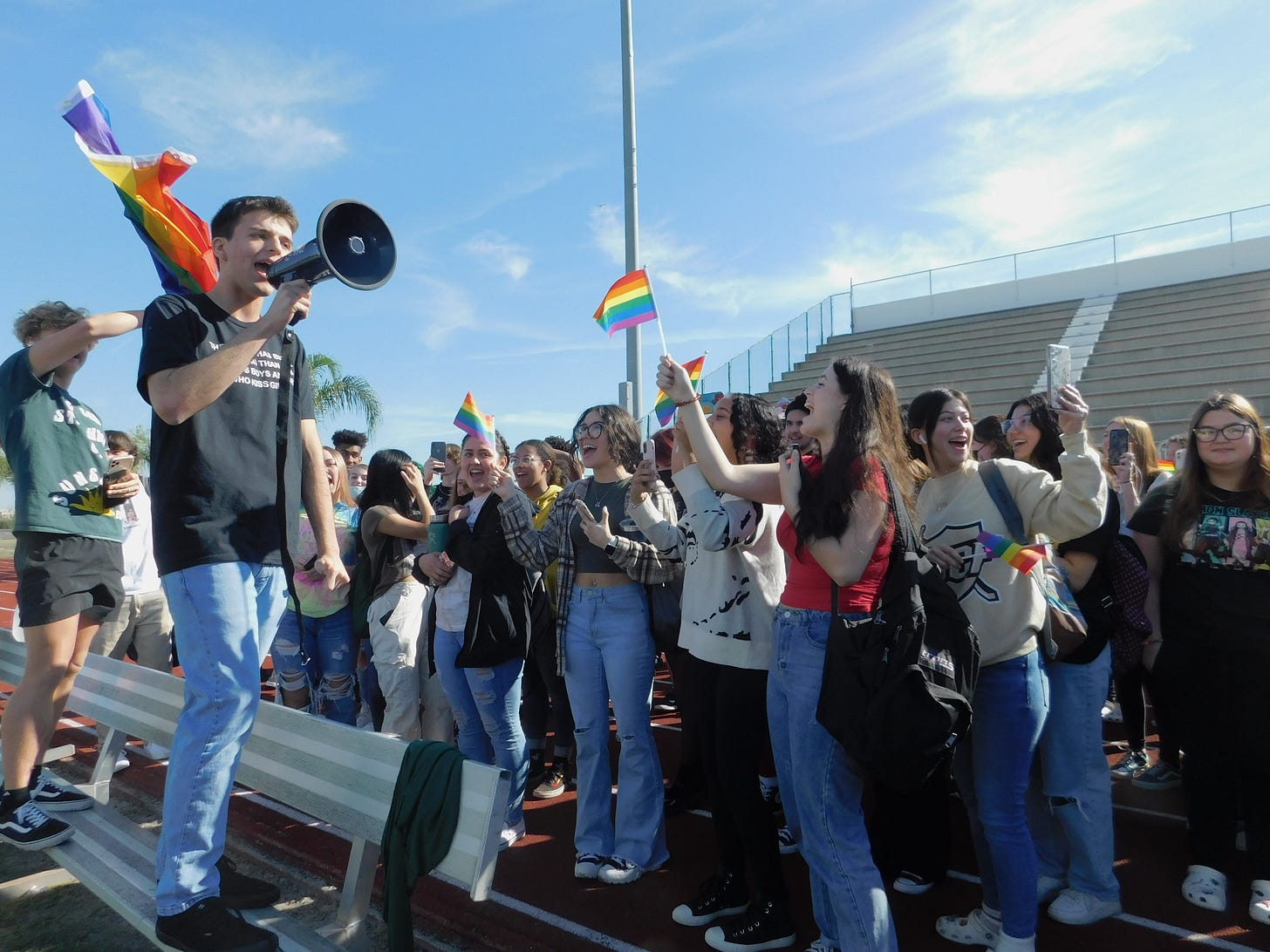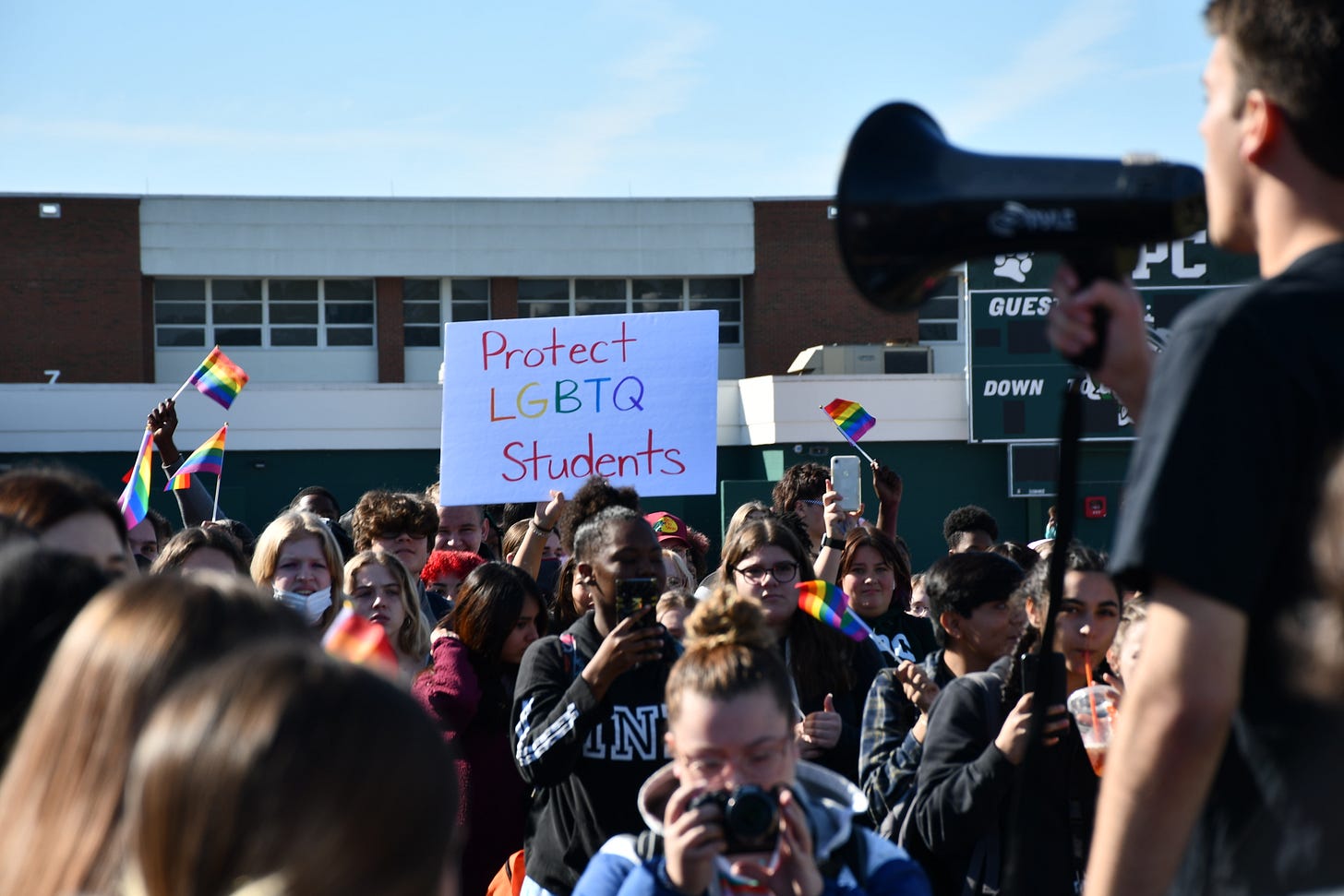The Up and Up Live, a conversation with student-activist Jack Petocz
Jack Petocz faced disciplinary action after leading a walkout in protest of Florida legislation dubbed the 'Don't Say Gay Bill' last year. Now he's applying to college.
Last week, Jack Petocz — an activist and high school senior who faced disciplinary action last year after leading a walkout in protest of Florida legislation dubbed the “Don’t Say Gay Bill” — tweeted:
“It’s a special type of pain to select that I’ve committed ‘disciplinary misconduct’ on a college application for peacefully protesting.”
This week he joined The Up and Up on Instagram Live to discuss. Here are some highlights from our conversation, edited for brevity:
Rachel Janfaza: I reached out because I saw your tweet last week. First — for those who may not know — can you give some context as to why you’re selecting disciplinary misconduct? And what is it like to have this be part of the story you’re telling as you’re applying to college?
Jack Petocz: I’m a gay student activist here in Florida. In March, I led the “Don’t Say Gay” walkouts that occurred across the state, and at my personal rally, I was suspended for passing out Pride flags. Since then I’ve faced further disciplinary action. I’ve gotten a level three referral that’s prevented me from running for student body president. I’ve faced a medley of abuse from my school district simply for exercising my First Amendment rights.
Now that I’m applying to colleges, it’s kind of come up again… it’s kind of always been that thing lingering in the background. On a lot of these applications you have to select whether or not you’ve committed disciplinary actions. It’s upsetting, when schools teach you for your entire life to exercise civic principles, and then when you finally follow through with those, you’re being punished for it. It’s something I’m going through.
RJ: Since you led that protest last year, have you been keeping up with the activism? What have you been doing in your school district, community, and across the country more broadly?
JP: Since the walkouts, I have continued to advocate. In the midterm elections I continued to do rallies across Florida and counter [Florida Governor Ron] DeSantis at his political events. Actually over the past few months, I’ve been traveling all over the country to talk about what’s ongoing in Florida…
We’re seeing the banning of Black history, which is really fitting on Black history month. We’re seeing attacks on our public education system. We’re seeing trans individuals being gone after. So I’ve been going to states where maybe they’re not as cognizant of what’s going on and they’re not as cognizant of crises that are going on across America, trying to spread that message, spread that urgency, and hopefully get resources diverted back here.
RJ: In Florida specifically, are you doing anything with regard to the blocking of the AP African American studies course or working on any other initiatives that are surrounding what’s being taught in the classroom, what’s allowed to be said in the classroom?
JP: I work with a nonprofit called Gen Z for Change… and we are working on a very special initiative to counter what’s ongoing with AP African American studies… it’s going to send a stark rebuke to College Board for what they did, stripping the course of a lot of its key concepts today that include things like intersectionality, queer theory, all different kinds of things that should be still in place in this course and provide students with a comprehensive understanding of Black history.
RJ: What are you focused on when it comes to the state of LGBTQ+ rights both in Florida and across the country?
JP: A lot of it comes down to responding to whatever’s going to go on in this legislative session – it just started here in Florida and we’ve already seen attacks. I’m going to Tallahassee next week to hear the Board of Medicine when they’re trying to go after trans healthcare… I think a lot of it is going to be reactionary and living in the moment and seeing how you can act strategically in the political landscape of Florida and try to channel action into whatever is ongoing at the time. It’s kind of TBD.
RJ: Will it be Florida specific or will you be looking at what other states and state legislations are doing too?
JP: Florida usually is kind of the ringleader in this. They’re usually the ones who start some type of legislative push and then we see it occur all across the nation – for example, it happened with ‘Don’t Say Gay.’ Florida was the start of it, and then we saw copy-cat bills pop up all across Republican states. So I think that Florida is going to be the start of it, but it could definitely have ripple effects all across the country.
RJ: What advice would you give to other young people like yourself – whether it be with regard to this issue or other issues that they see in their community?
JP: I would first say find community. Find friends, find trusted adults, find family members who are willing to come together with you and make change in your community. You can’t rely on yourself. You have to have a team of individuals who are ready and dedicated to the cause that you are fighting for. Number two… expect some sort of push back. Political issues are very divisive at times and very controversial, and you have to be ready to take on some sort of rebuke or some sort of abuse. Number three, something doesn’t have to be so complex. You don’t have to start a string of walkouts across Florida. I was knocking on doors for school board candidates for years before I ever did anything like that... The smallest acts can have ripple effects.
RJ: Along those lines, when there is pushback, when people don’t agree with you – regardless of the side of the political spectrum you’re on – how do you navigate that and what would be your best approach for having conversations with people who disagree with you?
JP: One of the downfalls of current American politics is that we can’t have respectful conversations. Something that I’ve done in my work is made it a point to go to the other side of the aisle and try to make my voice heard and then try to understand their perspective and try to find common ground… don’t always have preconceived notions about people if they align to a certain political party. Try to go to them directly and have those one-on-one connections, and I think you can make a lot of difference there.
Watch our full conversation here:





